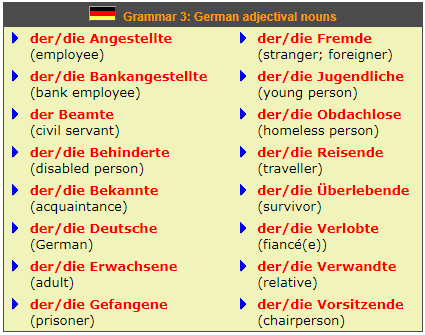All adjectives can be used as nouns in German. This is much more common than in English wher usage of such adjectives is restricted to certain instances in the plural (the old, the young, the French, etc.). German adjectives used as nouns (or "adjectival nouns") can either refer to people - in which case they are masculine or feminine - or abstract concepts, in which case they tend to be neuter.

Notes
1. Although formed from adjectives, adjectival nouns are written with a capital letter.
2. "Die Beamtin", a female civil servant, is not an adjectival noun. It declines just like a normal feminine noun ending in "-in" and has the plural "die Beamtinnen".
 英语
英语 日语
日语 韩语
韩语 法语
法语 西班牙语
西班牙语 意大利语
意大利语 阿拉伯语
阿拉伯语 葡萄牙语
葡萄牙语 越南语
越南语 俄语
俄语 芬兰语
芬兰语 泰语
泰语 丹麦语
丹麦语 对外汉语
对外汉语

